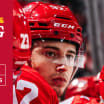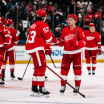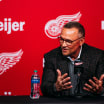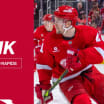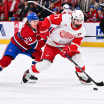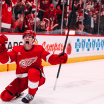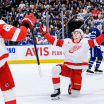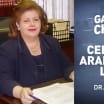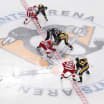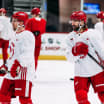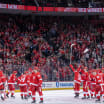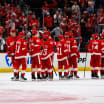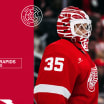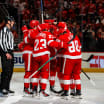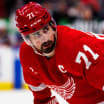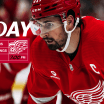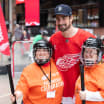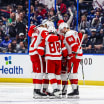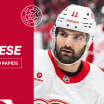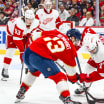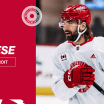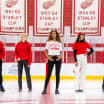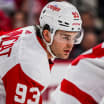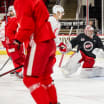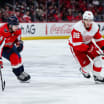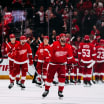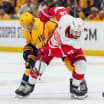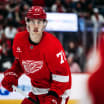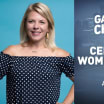DETROIT -- These Arizona Coyotes are not the same team that the Red Wings faced at the beginning of last season.
Last year, the Coyotes finished 21st in the NHL with 251 goals allowed and their penalty kill was 19th at 79.5 percent.
Notes: Wings wary of Coyotes' shorthanded prowess
Detroit honors cancer survivors and families at annual Hockey Fights Cancer Night
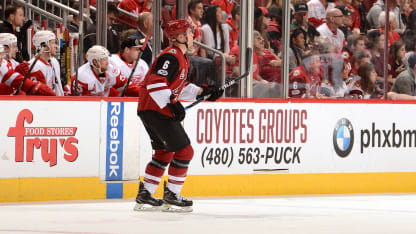
© Norm Hall/Getty Images
By
Dana Wakiji @Dwakiji / DetroitRedWings.com
Currently, the Coyotes are second in the league with 39 goals allowed (Nashville is first with 35 allowed) and their penalty kill is first at 91.8 percent.
Arizona also leads the league in shorthanded goals with nine, more than double the four that the second-place Red Wings, New York Islanders, Minnesota Wild and San Jose Sharks have.
"It's an interesting thing," Wings coach Jeff Blashill said Monday. "They've been able to capitalize. I think a decent amount of teams get chances on the penalty kill and they've been able to capitalize on them to a level that's probably never been seen before. I think the more impressive thing is how good their actual penalty kill is. It's one thing to score shorties but they haven't given much up at all.
"We're going to have to be ready to execute for sure. They've got a real confidence and swagger to them right now and we're going to have to try to do what we can to dent that."
Zona tonight. #ARIvsDET #LGRW https://t.co/okWd4UyIuP
— Detroit Red Wings (@DetroitRedWings) November 13, 2018
Anthony Mantha, who is usually net-front on the power play, has heard about the dangerous Coyotes penalty kill.
"Obviously, we need to be aware of it," Mantha said. "If we score first, they can't do anything afterwards, right? So that's going to be our plan. We just need to be smart with the puck. Obviously, we know they have good, quick players on their kill and I think it's three players that have a combined eight goals if I'm not mistaken. We need to be careful but at the same time, we need to play our game."
Rookie defenseman Dennis Cholowski, who quarterbacks one power-play unit, could be the last man in the way if the Coyotes break out shorthanded.
"You just have to move the puck quick and use each other and support each other all over the ice," Cholowski said. "The puck has to have people around it and support around it in order for us to have a working power play, especially with them. They have a lot of speed and they have a lot of shorthanded goals. We have to be aware of that and move pucks quick."
The Wings are currently 27th in goals scored with 45, just one ahead of the Coyotes, who have 44 but in one less game.
But the Coyotes have limited opponents to 39 goals while the Wings have allowed 59.
"They work. That's been one thing," Blashill said. "They do a good job with their forwards creating enough puck pressure that they don't have to invest their D as much. So their D aren't nearly as aggressive as let's say Carolina's D were coming down the walls in the O-zone on the forecheck because their forwards have allowed them enough puck pressure to not have to do it. They've gotten good goaltending.
"I would say with OEL (Oliver Ekman-Larsson), with (Niklas) Hjalmarsson, with (Alex) Goligoski, with (Jason) Demers, they've got a number of real good defensemen. They're a sneaky -- and I say sneaky because they probably don't get the respect they deserve -- really good D corps in the league. I think when you take those players and you combine them, you'd probably say it's one of the better D corps in the league. Hjalmarsson's one of the best defensive players in the league, OEL is one of the best D-men in the league, Goligoski, Demers, those guys have been good players for a while in the league. So they got a real good D corps and they've had good goaltending so the combination has allowed them to be good defensively."
CHYCHRUN BACK IN LINEUP: Cholowski and Jakob Chychrun will seemingly always be linked because the Red Wings traded their 2016 first-round pick, No. 16, along with the $7.5 million salary cap hit of Pavel Datsyuk to the Coyotes in exchange for the No. 20 pick, a second-round pick, No. 53, and injured forward Joe Vitale.
The Coyotes took Chychrun at No. 16 while the Wings selected Cholowski at No. 20 and defenseman Filip Hronek at No. 53.
Chychrun has been out this season with a lower-body injury but is expected to make his season debut tonight.
"I think it's a good lesson in patience and evaluating guys," Blashill said. "Chychrun, I think's going to be a real good player in the league and I think Cholowski's going to be a real good player in the league. But I think we got to give it time in the evaluation process. Getting in the league doesn't necessarily make you a great long-term player, having success early in your career doesn't necessarily make you a great long-term player. Proving it over and over and over again for a number of years is what makes you a great long-term player. I just think the patience in it.
"From where I sit, we've got a real good player in Cholowski who I think has a chance to be a great, real top-four type NHL defenseman and I also say we've got a real good player in Filip Hronek, who isn't here with us now but will be at some point over the course of this season or next. I think he's a real good prospect too."
Coyotes coach Rick Tocchet has told Chychrun to keep it simple for his first game back. He likes both young defensemen.
"Cholowski can play well. I actually like that kid," Tocchet said. "For Chick, he hasn't played a ton of games in the three years but it seems like he's been around. I judge him by his work ethic. When he had his (knee) surgery, he was in Philadelphia training with a guy the next day. So his whole summer was training. His mobility, that's the sort of stuff I love about him. Today's NHL defenseman, if you can skate, you can defend. You don't have to be a bone-crunching guy, but if you can defend the puck with quickness and get up the ice, that's the best way to play in five-man units. And he can join the rush for us. This is a guy that could potentially play 18 years in the league."
Cholowski said he never played against Chychrun growing up so he doesn't know him very well.
"Big guy, skates well," Cholowski said. "I was around him at the NHL combine and he's a big guy. He was already filled out. He was pretty much a man already. He's a pretty good player for sure."
HOCKEY FIGHTS CANCER NIGHT: Every game, there is a Blue Cross Blue Shield Youth Skater of the Game, but tonight's skater is particularly special.
Ethan Hainault, 11, was diagnosed with leukemia when he was just 4 years old and his mother, Brandi, was expecting her third child.
"We found out because he had some leg pain and wasn't really himself, he kind of had a cold and we brought him in and found out he had leukemia," Brandi Hainault said. "We started our little-over-three-year process of treatment and he finished when he was about 7 years old, almost 8."
Ethan is healthy now but still undergoes scans and blood work every six months to make sure.
"When he was diagnosed, we were expecting our third child so we just got through each day and that was your new normal," Brandi said. "To actually be able to something like this and celebrate the strength that he had and the fight that he went through and the years that he went being not like everyone else and trying to fit in, it's just an amazing thing. I can't even explain it."
Ethan will have his own stall in the room tonight. #HockeyFightsCancer 💜 https://t.co/SiiBUKaoS6
— Detroit Red Wings (@DetroitRedWings) November 13, 2018
Ethan is both a hockey fan and a hockey player.
Royale and Ryan Walter were in a similar situation to the Hainaults as their daughter, Mchalie, was diagnosed with leukemia when she was 4.
Mchalie is now 10 and has recovered from leukemia but she now suffers from adrenal insufficiency from her leukemia treatment and has to take steroids.
Mchalie and her parents, plus 2-year-old sister, Blakely, and 11-month-old brother, Preston, were at Little Caesars Arena to watch the morning skate, have lunch and meet some of the players afterwards.
.@antomantha8 & @wmmegan joining cancer patients, survivors and caretakers at this morning’s #hockeyfightscancer luncheon. 💜💜 #hockeytowncares #lgrw pic.twitter.com/FRzPoe2K8n
— Detroit Red Wings (@DetroitRedWings) November 13, 2018
"It's amazing to see her as a survivor," Royale said. "It's very exciting. It's nice to come to something and not think about the medical things that we face daily. (We're) huge hockey fans."
Blashill is very thankful that his three children have never had to go through what Ethan and Mchalie have been through. He knows all about it.
"One of my best, real closest friends had their oldest boy, who's a really good friend of mine, go through leukemia and beat it and what is he now, 14 years old and doing great, but went through a real tough battle," Blashill said. "I don't know it first-hand, I wasn't there but I did live it through them. I know how hard a battle it is, not just for the youngsters but for the families. It's just something that you certainly wouldn't wish on anybody. I can't imagine it for my own kids. But knowing the fight that's in so many of these young people and their families, it's amazing."
Mantha was one of the players who met with the families during their luncheon.
"(Hockey Fights Cancer) means a lot," Mantha said. "Obviously, my family was touched a little bit by cancer. I lost my grandma just over two years ago. It's something that touches every family, every human being almost, unfortunately. It's a great gesture from the NHL and from us, the players, to be a part of this and keep pushing forward for a cure."

